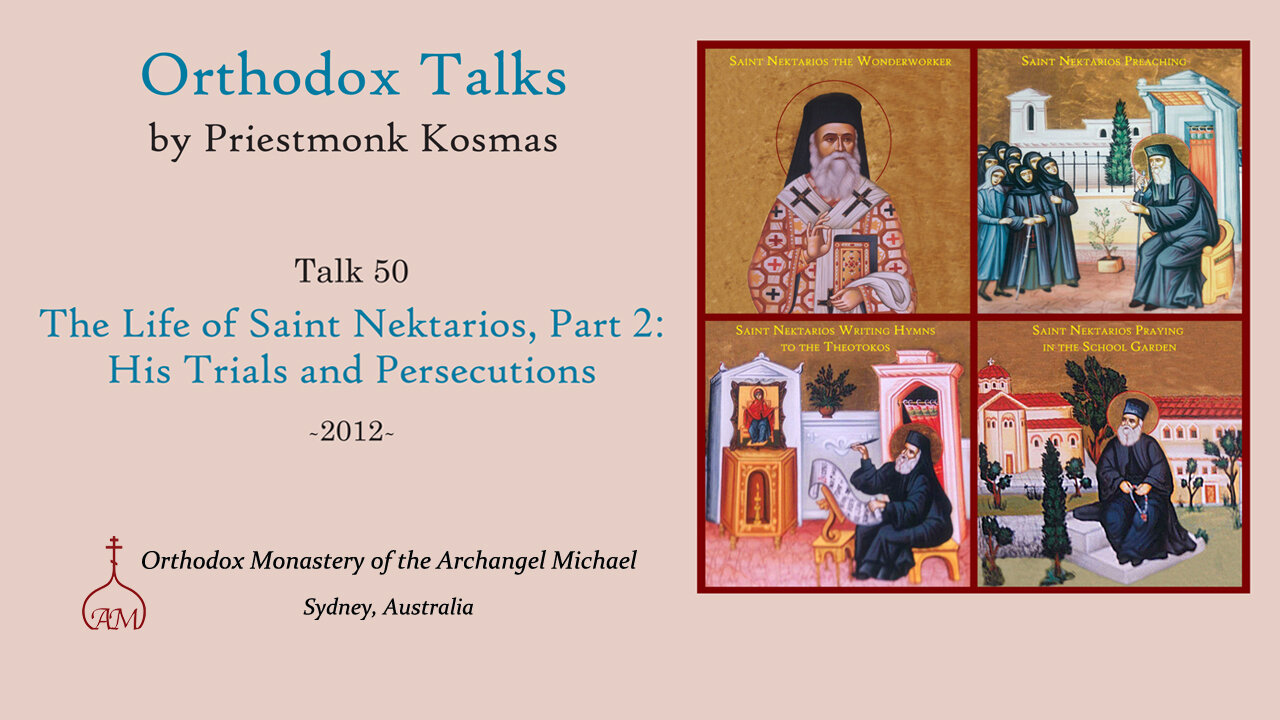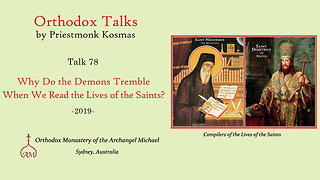Premium Only Content

Talk 50: The Life of Saint Nektarios, Part 2: His Trials and Persecutions
Orthodox Talks by Priestmonk Kosmas, Sydney, Australia
iTunes: https://podcasts.apple.com/us/podcast/orthodox-talks/id1659252607
Spotify: https://open.spotify.com/show/0sKZoGUhAjJua9RtjoZS73
Podcast: https://rss.com/podcasts/orthodoxtalks/
Due to his countless miracles, Saint Nektarios of Aegina is considered a wonderworker like Saint Nicholas and Saint Spyridon. However, few know that the saint suffered greatly from persecution, slander, and afflictions. Many would be shocked to learn that Saint Nektarios’ greatest enemies were actually Orthodox bishops and clergy. Thus, Saint Paul’s teaching that ‘all who desire to live godly in Christ Jesus will suffer persecution’ means persecution not only from those outside the Church, but also from those within the Church.
In this talk, Father Kosmas emphasizes that God allows those He loves to suffer temptations and afflictions in order to benefit their souls. He also discusses how distortions can occur in the accounts of the lives of the saints. One such distortion is found in some accounts of the life of Saint Nektarios. They write that Saint Nektarios endured trials meekly and without complaint, making no attempt to justify himself. In part 2 of the life of Saint Nektarios, Father Kosmas outlines in detail not only the saint’s trials and persecutions, but also the immense pain they caused him and his attempts to correct the injustice against him, and his love and forgiveness towards those who hated him.
The following questions are also discussed: how did the saint deal with a suicidal teenage boy? Can one be saved without sufferings? How did the saint prepare himself before preaching? What is the best way for priests to help the mentally ill? Why did the saint place so much emphasis on preaching the Word of God?
Other points covered in this talk include: children and emotional repression; how the world promises freedom without religion; how today many clergy worship psychology rather than God; and the saint’s valuable explanation of the importance of expressing one’s feelings, and the harmful effect when this is not done.
-
 4:00:03
4:00:03
Orthodox Talks
2 years agoTalk 78: Why Do the Demons Tremble When We Read the Lives of the Saints?
2.17K1 -

SpartakusLIVE
7 hours ago#1 Saturday Spartoons on RUMBLE PREMIUM
96.6K6 -
 1:04:59
1:04:59
Man in America
8 hours ago“Summoning the Demon” — The AI Agenda Is FAR WORSE Than We Know w/ Kay Rubacek
26.8K20 -
 2:16:48
2:16:48
Tundra Tactical
6 hours ago $0.06 earned🎯💥 The World’s Okayest Gun Show 🔫😂 | LIVE Tonight on Rumble!
15.6K -
 3:36:03
3:36:03
Mally_Mouse
1 day ago🌶️ 🥵Spicy BITE Saturday!! 🥵🌶️- Let's Play: Tower Unite!
37.2K1 -
 58:59
58:59
MattMorseTV
6 hours ago $1.12 earned🔴Trump just BROKE Newsom.🔴
55K60 -
 18:14
18:14
Her Patriot Voice
6 hours agoWho Is WORSE for NYC: Trump Girl or Socialist?
32K25 -
 3:39:42
3:39:42
SavageJayGatsby
5 hours agoSpicy Saturday with Mally! | Road to 100 | $300 Weekly Goal for Spicy Bites!
36.5K1 -
 3:35:50
3:35:50
FomoTV
7 hours ago🚨 Swamp Theater: FBI Raids Bolton 🕵 Still NO Epstein Files, Trump's Troops & the Red Heifer Hoax 🐂 | Fomocast 08.23.25
14.6K3 -
 6:04:40
6:04:40
Akademiks
10 hours agoRoc Nation & Meg Thee Stallion did a 7 HOUR Deposition with me. Drake Secret Kid Finally Revealed.
52.8K2